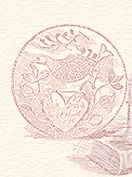| PA
German Dialect
Es Neinuhr Schtick
4-08-04
Ihr liewe Leit:
It’s
April! So what’s so great about April? Well, for starters, this year
Easter comes in April. And how many of you dear readers remember April 5,
1984? Thousands of you, I bet! Yes, you are all right; the Old
Professor’s very first column appeared on April 5, 1984 on the pages of
The Call. It seems then, that we have just ended our 20th
year and are this week starting our 21st.
And so
this may well be a good time to review some of the ideas that appeared in
the first column.
I first
of all commented on the occasional lack of good idiomatic English
translations, the results of my desire to render the Pennsylvania German
(PG) text into English equivalents that reflect as closely as reasonable
the PG constructions. I quote from by book A Pennsylvania
German and Reader (Penn State Press, 1982): “I hope readers who are
well-versed in formal English will forgive my less-than-formal and
unidiomatic English constructions they will at times find in the
translations of the PG texts. Especially for the beginning student, I
have attempted to translate the PG as literally as possible without
duplication the ridiculous restaurant placemat translations like ‘Throw
the cow over the fence some hay.’ Thus, ‘the schoolmaster is sitting also
already at the desk; may not be proper idiomatic English, but it does
reflect for the beginning student the progression of words in the
comparable PG construction, a result that I believe justifies sacrificing
a perfectly idiomatic English translation.”
The Old
Professor is, after all, interested in the presentation and teaching of
PG, not English.
Far more
serious is the possibility that some (many?) readers will insist that
these columns are written in Hochdeitsch – that is, Standard German (StG)
– rather than the PG dialect. Were this true, then it would have to be
true that PG writers have never used PG since they began writing in the
dialect more than 150 years ago, for as you regular readers are aware,
almost every column has contained examples of PG literature, including
Boonastiel and Hulsbuck, two of the most popular, beloved and revered PG
writers of all time.
A
part of this problem no doubt has to do with the vast number of words that
has slowly but surely disappeared from the average PG speaker’s
vocabulary, to be replaced by any handily available English equivalent.
Let me once again quote from my Reader and Grammar: “My students
who spoke PG even before they attended my PG classes have told me that the
text includes many words they have never heard of. I am then glad that I
have given them the opportunity to gather up some of the words and
expressions that have been lost during the 300 years that the PGs have
been in America.”
But I am
certain that the more important part of this problem has to do with the
way the Old Professor spells his PG. It is according to the so-called
Buffinton/Barba system of spelling, a system that is based on German sound
values rather than the English. Many PG writers, both past and present,
have chosen the English sound values to spell the dialect; the reader uses
his knowledge of English sounds to read the PG words. Several present-day
PG columnists use this system, and their regular readers, I am sure, have
become accustomed to the system and would not want the writers to change.
But one
irrefutable fact has led me to use the German system of sound values, and
thus the German system of spelling, for these columns: because English
vowels have as many as four or five different sound values, the reader
must have a prior knowledge of the dialect to read PG written “in
English.” Only those readers who have already mastered the dialect can be
certain that they are pronouncing the PG words correctly.
For
example, Joseph H. Light, in his Der Alt Schulmeeschder (1928),
spells the PG word for ‘house” as hous, with the ou pronounced as in E
“house.” He spells the PG word for “just” as youscht, with the ou this
time pronounced like ou in E “you”. One more example taken from scores of
such doublets: PG kott “had” with o pronounced as in E “hot,” but PG soll
with o pronounced (approximately) as in E go.”
Thus my
conclusion that a test meant for the beginning student of the dialect must
use German orthography; if nothing more, the relatively “purer” sound
values of German vowels allow the student a much better chance at an
informed guess of the correct pronunciation of dialect words he has not
seen before.
And so,
whether or not you insist on calling the PG of these columns “Hochdeitsch,”
the fact remains that for 20 years you have been reading the very best of
PG literature. The Old Professor will certainly not last another 20
years, but he is certain that there is still enough PG literature to last
several times 20 years!
Macht’s gut and take
care,
The Old Professor
|
Click here
to go to PA German Dialect archive page. |
|













